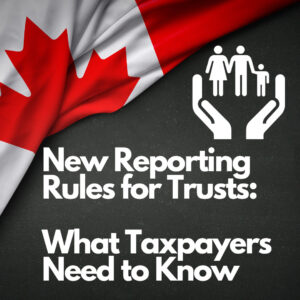Important Update! CRA Trust Reporting Requirements

Trust Reporting Requirements
The Government of Canada recently passed amendments to the Income Tax Act which impact the requirements for Trusts to file a T3 Trust Income Tax and Information Return (“T3 Return”). Starting for the 2023 year, all “express trust” must file a T3 Return even if they are inactive or were previously exempt from filing.
Examples of Express Trusts include:
- Family Trusts
- Alter Ego or Joint Partner Trusts
- Bare Trusts
What is a Bare Trust?
A Bare Trust is where the legal title of an asset is held by a trustee but a beneficiary has the beneficial ownership of the property. A Bare Trust is effectively a principal-agent relationship, which means that the trustee has no independent power, discretion, or responsibility over the property as the beneficiary has control over the trustee’s actions.
Examples of Common Bare Trusts
- As parents age, it is common for them to add their children to the legal title of their real estate. This can reduce the probate on the parent’s passing and ease estate administration. The children don’t really “own” the property until their parents pass away. These arrangements are considered bare trusts and now has a reporting obligation, even if there is no formal document that sets out the arrangement.
- Also, as parents age, children are frequently added to their parents’ bank and investment accounts for the same probate and estate administration reasons. These arrangements are also considered bare trusts and may has a reporting obligation unless they meet the exemption threshold as below.
- Child adds a parent to the title of their real estate to obtain financing.
- In corporate reorganizations, it has been very common to transfer the beneficial ownership of real estate from one taxpayer to a corporation. The legal title is not transferred so that Property Transfer Tax is not payable. This arrangement is a bare trust and now has a reporting obligation.
- Legal title for real estate is held on behalf of a group of owners in a joint venture or partnership.
Note: If any real estate is residential real estate, please contact us ASAP as you might also have an Underused Housing Tax (UHT) filing obligation.
Exemptions to Filing Requirements
The following trusts are exempt from requirements to filing a T3 Return:
- Trusts governed by certain plans (i.e. RRSP, RRIF, TFSA, etc)
- Graduated rate estates and qualified disability trusts
- Mutual fund trusts and trusts listed on stock market
- Lawyer general trust accounts
- Trusts in existence for less than 3 months
- Trusts that hold less than $50,000 FMV in assets throughout the year, where assets are only cash and marketable securities.
New Reporting Requirements
In addition to the new requirements to file, detailed information must be provided for all trustees, beneficiaries, settlors, and any person who can exert control or override trustee decisions on the appointment of the trust’s income or capital (e.g., a protector), including:
- name and address
- date of birth
- country/jurisdiction of residence, and
- taxpayer ID, such as SIN, trust account number, business number, or taxpayer ID used in a foreign jurisdiction
Due Date
The due date for the T3 Return is 90 days after the end of the year-end for the Trust. Most trusts have a December 31st year, which means that the due date for the 2023 T3 Return is March 30, 2024 (due to 2024 being a leap year).
Penalties for Non-Compliance
The penalties for late filing or non-filing can be significant. For late filing, the penalty is $25 per day late to a maximum of $2,500 per year. In cased of gross negligence, there is a penalty equal to the greater of $2,500 and 5% of the highest fair value of the Trust’s assets.
Trust Account Numbers
All Trusts will be required to have a Trust Account Number to be issued by the Canada Revenue Agency. If this is the first time filing a T3 Return for the Trust, we will apply for an Account Number prior to filing.
If your Trust has previously filed an income tax return, it would have been issued an Account Number (which can be found on a recent Notice of Assessment).
CRA Online Services & Represent a Client
The Canada Revenue Agency has created an online portal for Trusts called “My Trust Account”. This will be similar to the current “My Account” for individuals and “My Business Account” for businesses. Trustees can register for access to the My Trust Account if they already have a Represent a Client account. More information can be found here:
Once the Trustee has access to the My Trust Account, they will be able to designate access to the Trust’s information through the Represent a Client portal.
Future Planning
Though it is too late to undertake any planning to reduce the reporting obligations for the 2023 year, there are some practical tips to consider:
- Trustees should review their Trusts prior to December 31, 2023 to determine whether the trust should be wound up if it no longer serves its purpose. Close in-trust accounts that are no longer necessary. If these changes are made in 2023, then the Trust would still have an obligation to file and report this detailed information in its 2023 return. However, this would reduce future filings.
- Consider restructuring existing trusts to remove beneficiaries that are no longer required so that you don’t need to disclose their information. Note: There is still an obligation to report the required information if they were a beneficiary for part of the year.
Action Items
Please reach out to us if you have a trust that we have not filed in a previous year or if you have a bare trust. It is imperative that the T3 Return is filed because the penalties are significant.
